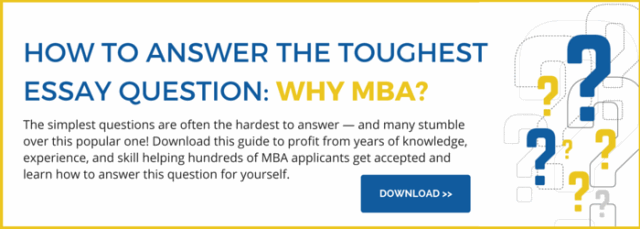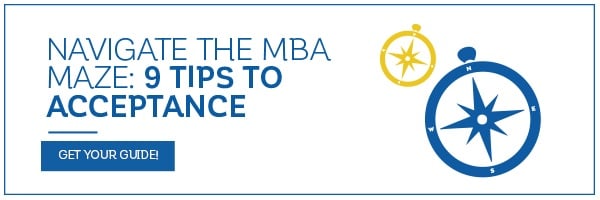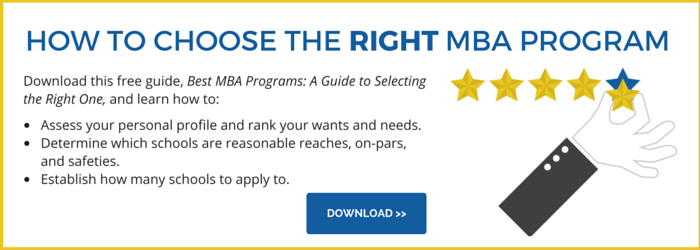|
|

GMAT Club Daily Prep
Thank you for using the timer - this advanced tool can estimate your performance and suggest more practice questions. We have subscribed you to Daily Prep Questions via email.
Customized
for You
Track
Your Progress
Practice
Pays
Not interested in getting valuable practice questions and articles delivered to your email? No problem, unsubscribe here.
Kudos
Bookmarks

By Adam Hoff, Amerasia Consulting Group
This is a post I write basically every year because it comes from what I'm seeing each round, every day, on basically every application. That drum beat is really rigid, hard-to-read Why School X sections on essays. I give the same note to every single client so now I'm giving it to everybody: the simplest and most important thing you can do to improve your Why School X portion of career goals essay is to personalize any and all content. This is a great way to avoid writing something off-putting, as well as a quick and easy method for making your essays warmer, more personal, and easier to connect with.
So, what do I mean by "personalizing" this part of the app? Simple: make anything you write about the school specific to you, your experience, your desires, or what you require from a program. Never just state absolutes, generalities, or even known truths and facts - always make them personally-held viewpoints. Examples are the best way to understand this (after the jump):
Example #1
GOOD - "I am seeking an intense MBA experience, which is why INSEAD is my top choice."
BAD - "INSEAD is one of the most intense MBA programs in the world."
WHY - The first sentence is a statement about what you want (an intense experience), which is used as justification for pursuing the school. It doesn't matter whether you are right or wrong in your assessment, so long as you believe it and can then base a decision on that belief. Whereas in the second sentence, you are simply stating a fact. There are multiple problems with this: A) you might be wrong, B) even if you are right it might sound lecturing (which can irritate a reader who is far more of an expert on the subject than you are), or C) even if you are right and the reader is not mildly irritated, you still miss a chance to express something about you. Anything in any essay that doesn't tell the reader more about you, your world, and what you want is wasted space.
Example #2
Good - "One thing that drew me to Duke right away was the small class size, which has always been the ideal setting for me to grow and learn."
BAD - "Small class sizes are the best way to learn, which is why I love Duke."
WHY - This one has a wrinkle, which is that the "bad" sentence sort of seems to personalize the statement with the "why I love Duke" part. The problem is that the revelation is still not based on a personal belief, but rather a statement of fact. Indeed, this statement of fact is even more egregious than the INSEAD statement above because it's offering up as concrete fact something that is highly debatable. Maybe large classes are the best way to learn. Maybe it's online. Maybe it's one-on-one. Who are you to say? Who am I to say? None of us are experts in the sphere of ideal learning models, so this just sounds completely arrogant. Whereas in the "good" example, we see that it's simply a personal preference that is the basis for further interest in Duke.
I could go on and on and write 10 examples, but two is probably enough. The main thing is to read every single sentence you write about a program and make sure that it's always personal - told from your perspective, your opinion, your beliefs, and your desires. If it dissolves into "brochure writing" - just statements of fact, no matter how benign or flattering to the school - there is zero upside and plenty of downside.
It's a small thing, but we see it crop up in probably 90% of the essays we read, so it's obviously a fairly widespread problem. And while it may not be the entire difference between being admitted or denied, it can definitely be the difference between getting a good or a bad read of your file. And in our experience, *that* is often the difference between being admitted or denied.
----------------------------------------------------------------------------------------------------------------------------------------------------------------------------------------
If you are interested in making sure your essays are personalized (as well as everything else they need to be), hit us up at mba@amerasiaconsulting.com.
Archived Duke Fuqua Discussion
Hi there,
You've stumbled upon an old discussion from our Duke Fuqua Forum
that's now outdated and has been archived. No more replies are possible here.
Interested in current discussions? Feel free to dive into our dedicated Duke Fuqua Forum
for all fresh things related to the Duke Fuqua MBA program.
Thank you for understanding, and happy exploring!
Kudos
Bookmarks

Duke Fuqua is a community focused MBA program that seeks “leaders of consequence.” Fuqua sees a new business environment, where impeccable ethics, a disruptive attitude and other personal attributes are more and more important.
This set of essays provides significant room to explain who you are and why Fuqua is the right next step for you, both personally and professionally.
In this essay set you are asked for 25 new facts, to outline your career goals and explain why Fuqua to round out your resume, academic profile and recommendations.
As always, it is important to demonstrate that you know Duke Fuqua well and are a strong fit with the program. Starting your research and personal networking now will put you in a solid position to prepare the most specific and effective essays.
Stacy Blackman Consulting can help you prepare a compelling, individualized strategy to approach your Duke Fuqua application this year, contact us to learn more.
REQUIRED SHORT ANSWER QUESTIONS
Instructions: Answer all 3 of the following questions. For each question, respond in 500 characters only (the equivalent of about 100 words).
1. What are your short-term goals, post-MBA?
2. What are your long-term goals?
3. Life is full of uncertainties, and plans and circumstances can change. As a result, navigating a career requires you to be adaptable. Should the short-term goals that you provided above not materialize what alternative directions have you considered?
This career goals essay asks for your plan in three parts. First, you should describe what you plan to do immediately after your MBA. Then you’ll explain the long-term vision for your career. Finally, Duke admits that many career paths are forged through circumstance, and asks you for your Plan B.
Think big picture and focus on the overall story trajectory. What would be the most logical (and interesting) progression from your current skill set and MBA education? How will your next step flow from the combination of those experiences? And your alternative path ideally isn’t a massive departure, but simply shows the areas you could see yourself exploring if your primary plan doesn’t materialize.
For example, perhaps you are focused on becoming a marketing executive within the consumer packaged goods industry, such as General Mills. If you don’t find the suitable position after Duke, maybe you would consider marketing for a retailer, such as Target, as your alternate career path because marketing is still the function you are interested in developing a career within.
Alternatively, you may have two disparate interests and want to consider both of them. Perhaps your Plan A is to join a strategy consulting firm after graduation, but if you don’t receive a spot among your top choices you would think about co-founding a start up as another possible path. Think about your range of interests and go from there.
Because you have limited space, you’ll have to boil your plans down in a clear statement of what you plan to do, but ideally any plans are supported by the information provided in your resume, recommendations, and other essays.
FIRST REQUIRED ESSAY: 25 RANDOM THINGS ABOUT YOURSELF
Instructions: Present your response in list form, numbered 1 to 25. Some points may be only a few words, while others may be longer. Your complete list should not exceed 2 pages.
The “Team Fuqua” spirit and community is one of the things that sets The Duke MBA experience apart, and it is a concept that extends beyond the student body to include faculty, staff, and administration. When a new person joins the Admissions team, we ask that person to share with everyone in the office a list of “25 Random Things About Yourself.”
As an Admissions team, we already know the new hire’s professional and academic background, so learning these “25 Random Things” helps us get to know someone’s personality, background, special talents, and more.
In this spirit, the Admissions Committee also wants to get to know you–beyond the professional and academic achievements listed in your resume and transcript.
You can share with us important life experiences, your likes/dislikes, hobbies, achievements, fun facts, or anything that helps us understand what makes you who you are. Share with us your list of “25 Random Things” about YOU.
This essay is entirely open ended and you can cover topics spanning your personal background, work experiences, values and hobbies. If you have a particularly interesting story in any of those areas, this is the place to tell that story.
Whatever areas you choose to highlight, make sure you are following the admissions committee’s advice to share what makes you a dynamic, multi-dimensional person.
Coming up with 25 random things to list in this essay may seem daunting at first. To jumpstart your creative process you may want to brainstorm with friends and family about what is most interesting and memorable about you. Or keep a notebook with you to record thoughts as you go about work and personal activities.
Once you have 25 random things, how do you structure your list? There’s a few possible ways to proceed: chronologically, chunking the list into themes, or even alphabetically.
You may want to organize the list so that it builds from shorter to longer items, or you may want to intersperse some of the 25 random things that require a paragraph explanation between sets of things that are easy to understand in one sentence.
Structuring the list to make it easy to read and follow will be appreciated, but resist the urge to package the list too perfectly. Content is always the most important factor and remember that the primary purpose of this essay/list is to show Duke your multi-faceted life and interests.
SECOND REQUIRED ESSAY
Instructions: Your response should be no more than 2 pages in length.
Fuqua prides itself on cultivating a culture of engagement. Our students enjoy a wide range of student-led organizations that provide opportunities for leadership development and personal fulfillment, as well as an outlet for contributing to society.
Our student-led government, clubs, centers, and events are an integral part of the student culture and are vital to providing you with a range of experiential learning and individual development experiences.
Based on your understanding of the Fuqua culture, how do you see yourself engaging in and contributing to our community, outside of the classroom?
The best essays will be both specific and personal, while demonstrating you have done your homework on Fuqua. While everyone benefits from a diverse alumni network, what specifically do you want to give and receive from your classmates?
If you describe clubs and classes you are attracted to, also offer specific examples from your past experiences to show your consistent personal or professional passions.
Your fit with the program is crucial, and therefore you must exhibit the qualities Duke is seeking as well. The Duke MBA program is especially interested in your role within the community, and will place significant weight on this factor. If you research thoroughly and are specific, you should be able to clearly demonstrate why you are going to be strong contributor and teammate.
This essay can also be a place to talk about how the Duke MBA fits into your career goals. What do you know now that will be enhanced through your MBA education? And what crucial aspects of the skill set required for your future career will be augmented by attending Duke?
However, the main focus should be your community involvement and how you plan to improve the experience of others at Duke both in and outside the classroom.
Optional Essay
If you feel there are circumstances of which the Admissions Committee should be aware, please explain them in an optional essay (such as unexplained gaps in work, choice of recommenders, inconsistent or questionable academic performance).
• Do NOT upload additional essays nor additional recommendations in this area of the application.
• The Optional Essay is intended to provide the Admissions Committee with insight into your circumstances only.
• Limit your response to one page.
As with most optional essays, the Duke MBA asks that you use this space only to explain extenuating circumstances. If you have a low GPA, lack a recommendation from your current supervisor or have gaps in work history this is the correct place to address those issues. If you do not have any of those areas to explain, it’s best to skip this question and focus only on the previous three essays.
When approaching any concerns about your background in the optional essay it’s important to focus on recent performance, whether academic or professional, and what such performance demonstrates about your ability.
Your goal is to remove questions from your application and to address in a factual manner any information the admissions committee needs to know to fairly evaluate your application. The essay should convey, in a positive manner, that you know there could be questions about your background but you have thoroughly improved in any areas necessary.
***
If you are looking for guidance on your MBA application, Stacy Blackman Consulting can help with hourly and comprehensive consulting services. Contact us to learn more. Visit the website for Stacy Blackman Reviews, and check out the company’s e-publications for more in depth school-by-school guidance.
Kudos
Bookmarks

The Fuqua School of Business at Duke University has posted the application deadlines, three short-answer questions and two required essay questions for the 2016-2017 MBA admissions season.
Deadlines
Early Action
Deadline: September 13, 2016
Decision notification: October 20, 2016
Round 1
Deadline: October 13, 2016
Decision notification: December 16, 2016
Round 2
Deadline: January 4, 2017
Decision notification: March 15, 2017
Round 3
Deadline: March 20, 2017
Decision notification: April 17, 2017
The Early Action option is ideal for applicants who have completed their MBA research and have decided that this is the best program for them. Applicants admitted in Early Action must submit a tuition deposit along with official transcript(s) by December 9, 2016.
If your ability to enroll is dependent upon receiving merit-based scholarship assistance, you should apply during Early Action, Round 1, or Round 2.
International Applicants: you must apply during Early Action, Round 1, or Round 2 for visa processing.
Re-applicants: reapply for during Early Action or Round 1.
Required Short Answer Questions
Instructions: Answer all 3 of the following questions. For each question, respond in 500 characters only (the equivalent of about 100 words).
- What are your short-term goals, post-MBA?
- What are your long-term goals?
- Life is full of uncertainties, and plans and circumstances can change. As a result, navigating a career requires you to be adaptable. Should the short-term goals that you provided above not materialize what alternative directions have you considered?
Instructions: Present your response in list form, numbered 1 to 25. Some points may be only a few words, while others may be longer. Your complete list should not exceed 2 pages.
The “Team Fuqua” spirit and community is one of the things that sets The Duke MBA experience apart, and it is a concept that extends beyond the student body to include faculty, staff, and administration. When a new person joins the Admissions team, we ask that person to share with everyone in the office a list of “25 Random Things About Yourself.” As an Admissions team, we already know the new hire’s professional and academic background, so learning these “25 Random Things” helps us get to know someone’s personality, background, special talents, and more.
In this spirit, the Admissions Committee also wants to get to know you–beyond the professional and academic achievements listed in your resume and transcript. You can share with us important life experiences, your likes/dislikes, hobbies, achievements, fun facts, or anything that helps us understand what makes you who you are. Share with us your list of “25 Random Things” about YOU.
Second Required Essay
Instructions: Your response should be no more than 2 pages in length.
Fuqua prides itself on cultivating a culture of engagement. Our students enjoy a wide range of student-led organizations that provide opportunities for leadership development and personal fulfillment, as well as an outlet for contributing to society. Our student-led government, clubs, centers, and events are an integral part of the student culture and are vital to providing you with a range of experiential learning and individual development experiences.
Based on your understanding of the Fuqua culture, how do you see yourself engaging in and contributing to our community, outside of the classroom?
Optional Essay
If you feel there are circumstances of which the Admissions Committee should be aware, please explain them in an optional essay (such as unexplained gaps in work, choice of recommenders, inconsistent or questionable academic performance).
- Do NOT upload additional essays nor additional recommendations in this area of the application.
- The Optional Essay is intended to provide the Admissions Committee with insight into your circumstances only.
- Limit your response to one page.
For more information, please visit the Duke MBA admissions website.
***
If you are looking for guidance on your MBA application, Stacy Blackman Consulting can help with hourly and comprehensive consulting services. Contact us to learn more. Visit the website for Stacy Blackman Reviews, and check out the company’s e-publications for more in depth school-by-school guidance.






















